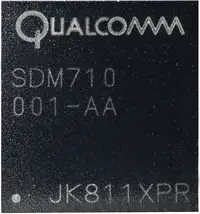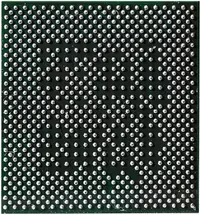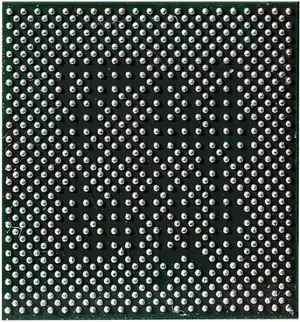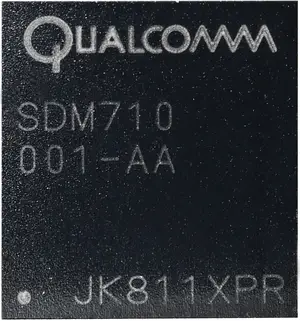(Created page with "{{qualcomm title|Snapdragon 710}} {{chip}} '''Snapdragon 710''' is a high-performance mid-range {{arch|64}} ARM LTE system on a chip designed by Qualcomm and i...") |
(→Graphics) |
||
| (62 intermediate revisions by 31 users not shown) | |||
| Line 1: | Line 1: | ||
{{qualcomm title|Snapdragon 710}} | {{qualcomm title|Snapdragon 710}} | ||
| − | {{chip}} | + | {{chip |
| − | '''Snapdragon 710''' is a | + | |name=Snapdragon 710 |
| + | |image=snapdragon 710 (front).png | ||
| + | |back image=snapdragon 710 (back).png | ||
| + | |designer=Qualcomm | ||
| + | |designer 2=ARM Holdings | ||
| + | |manufacturer=Samsung | ||
| + | |model number=SDM710 | ||
| + | |market=Mobile | ||
| + | |first announced=May 23, 2018 | ||
| + | |first launched=May 23, 2018 | ||
| + | |family=Snapdragon 700 | ||
| + | |frequency=2,200 MHz | ||
| + | |frequency 2=1,700 MHz | ||
| + | |isa=ARMv8 | ||
| + | |isa family=ARM | ||
| + | |microarch=Cortex-A75 | ||
| + | |microarch 2=Cortex-A55 | ||
| + | |core name=Kryo 360 Gold | ||
| + | |core name 2=Kryo 360 Silver | ||
| + | |process=10 nm | ||
| + | |technology=CMOS | ||
| + | |word size=64 bit | ||
| + | |core count=8 | ||
| + | |thread count=8 | ||
| + | |max cpus=1 | ||
| + | |max memory=8 GiB | ||
| + | |successor=Snapdragon 712 | ||
| + | |successor link=qualcomm/snapdragon_700/712 | ||
| + | |successor 2=Snapdragon 730 | ||
| + | |successor 2 link=qualcomm/snapdragon_700/730 | ||
| + | }} | ||
| + | '''Snapdragon 710''' is a mid-range {{arch|64}} [[ARM]] [[LTE]] [[system on a chip]] designed by [[Qualcomm]] and introduced in mid-[[2018]]. Fabricated on Samsung's [[10 nm process|10nm LPE process]], the 710 features six [[Kryo 360 Silver]] high-efficiency cores operating at 1.7 GHz along with two high-performance [[Kryo 360 Gold]] operating at 2.2 GHz. The Snapdragon 710 integrates the {{qualcomm|Adreno 616}} [[GPU]] operation at 500 MHz and features an X15 LTE modem supporting Cat 13 uplink and Cat 15 downlink. This chip supports up to 8 GiB of dual-channel LPDDR4X-3733 memory. | ||
| + | |||
| + | == Overview == | ||
| + | Positioned as a higher-end successor to the [[snapdragon 660|660]], the 710 is said to deliver up to 20% higher performance based on [[SPECint2000]] scores. Manufactured on Samsung's [[10 nm process]], the 710 features two high-performance cores based on the {{armh|Cortex-A75|l=arch}} microarchitecture and six low-power cores based on the {{armh|Cortex-A55|l=arch}} microarchitecture. This chip incorporates the X15 LTE modem which is roughly over 30% faster in download than the X12 found in the [[snapdragon 660|660]], supporting Cat 15 up to 800 Mbps download and Cat 13 up to 150 Mbps upload. | ||
| + | |||
| + | == Memory controller == | ||
| + | {{memory controller | ||
| + | |type=LPDDR4X-3733 | ||
| + | |ecc=No | ||
| + | |max mem=8 GiB | ||
| + | |controllers=1 | ||
| + | |channels=2 | ||
| + | |width=16 bit | ||
| + | |max bandwidth=13.91 GiB/s | ||
| + | |frequency=1866 MHz | ||
| + | |bandwidth schan=6.95 GiB/s | ||
| + | |bandwidth dchan=13.91 GiB/s | ||
| + | }} | ||
| + | |||
| + | == DSP == | ||
| + | {{#set: dsp|Hexagon 685 DSP}} | ||
| + | This chip features [[Qualcomm]]'s {{qualcomm|Hexagon}} {{qualcomm|Hexagon 685|685}} DSP with a Hexagon Vector Processor. | ||
| + | |||
| + | == Graphics == | ||
| + | {{integrated graphics | ||
| + | | gpu = Adreno 616 | ||
| + | | designer = Qualcomm | ||
| + | | execution units = | ||
| + | | max displays = | ||
| + | | max memory = | ||
| + | | frequency = 500 MHz | ||
| + | | max frequency = | ||
| + | |||
| + | | output crt = | ||
| + | | output sdvo = | ||
| + | | output dsi = Yes | ||
| + | | output edp = | ||
| + | | output dp = | ||
| + | | output hdmi = | ||
| + | | output vga = | ||
| + | | output dvi = | ||
| + | |||
| + | | directx ver = 12 | ||
| + | | opengl es ver = 3.2 | ||
| + | | openvg ver = | ||
| + | | opencl ver = 2.0 | ||
| + | | vulkan ver = 1.0 | ||
| + | }} | ||
| + | |||
| + | * Hardware Acceleration | ||
| + | * 4K HDR video playback (10-bit color depth, Rec. 2020 color gamut) | ||
| + | * Decode: H.264 (AVC), H.265 (HEVC) and VP9 | ||
| + | |||
| + | * Up to 4K Ultra HD video capture @ 30FPS | ||
| + | * Up to 1080p video capture @120 FPS | ||
| + | |||
| + | == Audio == | ||
| + | * Aqstic audio codec and Aqstic smart speaker amplifier | ||
| + | ** Up to native DSD support, PCM up to 384 kHz/32-bit 48.000 - 96.000 kHz | ||
| + | * Qualcomm aptX audio playback with support for aptX Classic and HD | ||
| + | |||
| + | == ISP == | ||
| + | * Qualcomm {{qualcomm|Spectra}} {{qualcomm|Spectra 250|250}} image sensor processor | ||
| + | |||
| + | * 2x Image Sensor Processor (ISP) | ||
| + | * 14-bit | ||
| + | |||
| + | Megapixel: | ||
| + | |||
| + | * Up to 20 MP dual camera | ||
| + | * Up to 32 MP single camera | ||
| + | |||
| + | == Connectivity == | ||
| + | * WiFi | ||
| + | ** Integrated 802.11ac 2 x 2 with MU-MIMO | ||
| + | ** Tri-band Wi-Fi: 2.4 GHz and 5 GHz with Dual Band Simultaneous (DBS) + 60 GHz | ||
| + | * Bluetooth 5.0 | ||
| + | * RF Front End | ||
| + | * LTE Modem | ||
| + | ** Snapdragon X15 | ||
| + | *** Downlink: | ||
| + | **** Category 15 up to 800 Mbps | ||
| + | **** 3 x 20 MHz carrier aggregation, up to 256-QAM | ||
| + | **** Up to 4 x 4 MIMO on two aggregated carriers | ||
| + | *** Uplink: | ||
| + | **** Category 13 up to 150 Mbps | ||
| + | **** 2 x 20 MHz carrier aggregation, up to 64-QAM | ||
| + | |||
| + | == Location == | ||
| + | * GPS | ||
| + | ** Glonass, BeiDou, Galileo, QZSS, and SBAS | ||
| + | * Low power geofencing and tracking, sensor assisted navigation | ||
| + | |||
| + | == Utilizing devices == | ||
| + | * [[used by::Xiaomi Mi 8 SE]] | ||
| + | * [[used by::Xiaomi Mi 9 Lite]] | ||
| + | * [[used by::Vivo NEX]] | ||
| + | * [[used by::Nokia X7]] | ||
| + | * [[used by::Meizu X8]] | ||
| + | * [[used by::Meizu 16]] | ||
| + | * [[used by::Nokia 8.1]] | ||
| + | * [[used by::Samsung Galaxy A8s]] | ||
| + | * [[used by::Lenovo Z5s]] | ||
| + | * [[used by::Lenovo Z5 Pro]] | ||
| + | * [[used by::Lenovo Z6 Youth]] | ||
| + | * [[used by::Lenovo K10 Note]] | ||
| + | * [[used by::Realme 3 Pro]] | ||
| + | * [[used by::Realme X]] | ||
| + | * [[used by::Oppo K3]] | ||
| + | * [[used by::Motorola Razr 2019]] | ||
| + | * [[used by::motorola one fusion]] | ||
| + | * Oppo R17 Pro | ||
| + | {{expand list}} | ||
| + | |||
| + | == Documents == | ||
| + | * [[:File:sdm710-brief.pdf|Product Brief]] | ||
| + | * [[:File:sdm710-mobile-platform-presentation.pdf|Presentation]] | ||
Latest revision as of 05:47, 20 July 2024
| Edit Values | |
| Snapdragon 710 | |
 | |
| General Info | |
| Designer | Qualcomm, ARM Holdings |
| Manufacturer | Samsung |
| Model Number | SDM710 |
| Market | Mobile |
| Introduction | May 23, 2018 (announced) May 23, 2018 (launched) |
| General Specs | |
| Family | Snapdragon 700 |
| Frequency | 2,200 MHz, 1,700 MHz |
| Microarchitecture | |
| ISA | ARMv8 (ARM) |
| Microarchitecture | Cortex-A75, Cortex-A55 |
| Core Name | Kryo 360 Gold, Kryo 360 Silver |
| Process | 10 nm |
| Technology | CMOS |
| Word Size | 64 bit |
| Cores | 8 |
| Threads | 8 |
| Max Memory | 8 GiB |
| Multiprocessing | |
| Max SMP | 1-Way (Uniprocessor) |
| Packaging | |
 | |
| Succession | |
Snapdragon 710 is a mid-range 64-bit ARM LTE system on a chip designed by Qualcomm and introduced in mid-2018. Fabricated on Samsung's 10nm LPE process, the 710 features six Kryo 360 Silver high-efficiency cores operating at 1.7 GHz along with two high-performance Kryo 360 Gold operating at 2.2 GHz. The Snapdragon 710 integrates the Adreno 616 GPU operation at 500 MHz and features an X15 LTE modem supporting Cat 13 uplink and Cat 15 downlink. This chip supports up to 8 GiB of dual-channel LPDDR4X-3733 memory.
Contents
Overview[edit]
Positioned as a higher-end successor to the 660, the 710 is said to deliver up to 20% higher performance based on SPECint2000 scores. Manufactured on Samsung's 10 nm process, the 710 features two high-performance cores based on the Cortex-A75 microarchitecture and six low-power cores based on the Cortex-A55 microarchitecture. This chip incorporates the X15 LTE modem which is roughly over 30% faster in download than the X12 found in the 660, supporting Cat 15 up to 800 Mbps download and Cat 13 up to 150 Mbps upload.
Memory controller[edit]
|
Integrated Memory Controller
|
||||||||||||||||||
|
||||||||||||||||||
DSP[edit]
This chip features Qualcomm's Hexagon 685 DSP with a Hexagon Vector Processor.
Graphics[edit]
|
Integrated Graphics Information
|
||||||||||||||||||||||||||||
|
||||||||||||||||||||||||||||
- Hardware Acceleration
- 4K HDR video playback (10-bit color depth, Rec. 2020 color gamut)
- Decode: H.264 (AVC), H.265 (HEVC) and VP9
- Up to 4K Ultra HD video capture @ 30FPS
- Up to 1080p video capture @120 FPS
Audio[edit]
- Aqstic audio codec and Aqstic smart speaker amplifier
- Up to native DSD support, PCM up to 384 kHz/32-bit 48.000 - 96.000 kHz
- Qualcomm aptX audio playback with support for aptX Classic and HD
ISP[edit]
- 2x Image Sensor Processor (ISP)
- 14-bit
Megapixel:
- Up to 20 MP dual camera
- Up to 32 MP single camera
Connectivity[edit]
- WiFi
- Integrated 802.11ac 2 x 2 with MU-MIMO
- Tri-band Wi-Fi: 2.4 GHz and 5 GHz with Dual Band Simultaneous (DBS) + 60 GHz
- Bluetooth 5.0
- RF Front End
- LTE Modem
- Snapdragon X15
- Downlink:
- Category 15 up to 800 Mbps
- 3 x 20 MHz carrier aggregation, up to 256-QAM
- Up to 4 x 4 MIMO on two aggregated carriers
- Uplink:
- Category 13 up to 150 Mbps
- 2 x 20 MHz carrier aggregation, up to 64-QAM
- Downlink:
- Snapdragon X15
Location[edit]
- GPS
- Glonass, BeiDou, Galileo, QZSS, and SBAS
- Low power geofencing and tracking, sensor assisted navigation
Utilizing devices[edit]
- Xiaomi Mi 8 SE
- Xiaomi Mi 9 Lite
- Vivo NEX
- Nokia X7
- Meizu X8
- Meizu 16
- Nokia 8.1
- Samsung Galaxy A8s
- Lenovo Z5s
- Lenovo Z5 Pro
- Lenovo Z6 Youth
- Lenovo K10 Note
- Realme 3 Pro
- Realme X
- Oppo K3
- Motorola Razr 2019
- motorola one fusion
- Oppo R17 Pro
This list is incomplete; you can help by expanding it.
Documents[edit]
- all microprocessor models
- microprocessor models by qualcomm
- microprocessor models by qualcomm based on cortex-a75
- microprocessor models by qualcomm based on cortex-a55
- microprocessor models by arm holdings
- microprocessor models by arm holdings based on cortex-a75
- microprocessor models by arm holdings based on cortex-a55
- microprocessor models by samsung
| back image |  + + |
| base frequency | 2,200 MHz (2.2 GHz, 2,200,000 kHz) + and 1,700 MHz (1.7 GHz, 1,700,000 kHz) + |
| core count | 8 + |
| core name | Kryo 360 Gold + and Kryo 360 Silver + |
| designer | Qualcomm + and ARM Holdings + |
| family | Snapdragon 700 + |
| first announced | May 23, 2018 + |
| first launched | May 23, 2018 + |
| full page name | qualcomm/snapdragon 700/710 + |
| instance of | microprocessor + |
| isa | ARMv8 + |
| isa family | ARM + |
| ldate | May 23, 2018 + |
| main image |  + + |
| manufacturer | Samsung + |
| market segment | Mobile + |
| max cpu count | 1 + |
| microarchitecture | Cortex-A75 + and Cortex-A55 + |
| model number | 710 + |
| name | Snapdragon 710 + |
| process | 10 nm (0.01 μm, 1.0e-5 mm) + |
| smp max ways | 1 + |
| technology | CMOS + |
| thread count | 8 + |
| word size | 64 bit (8 octets, 16 nibbles) + |